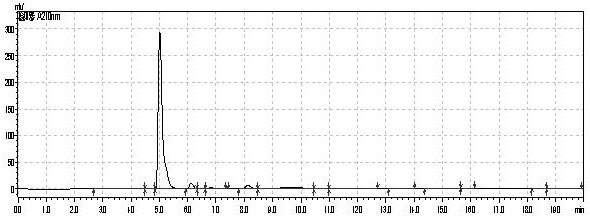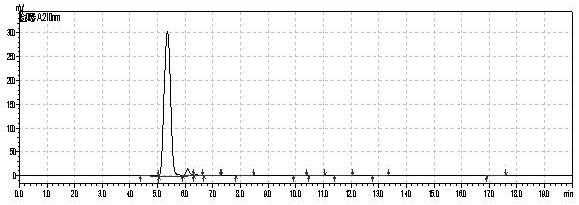A method for converting arginine into agmatine by catalyzing whole cells of bacteria
A whole cell, arginine technology, applied in the field of bioengineering, can solve the problems of increased burden of purification and extraction, cell fragmentation, etc., and achieve the effects of easy crystallization and purification, high transformation efficiency, and short fermentation cycle
- Summary
- Abstract
- Description
- Claims
- Application Information
AI Technical Summary
Problems solved by technology
Method used
Image
Examples
Embodiment 1
[0037] Embodiment 1: Optimization of crystallization conditions of agmatine
[0038] Since the existing scientific research materials have not yet found relevant information on the crystallization of agmatine, the present invention investigates the influence of various organic solvents on the crystallization of agmatine, including methanol and ethanol. Although these organic solvents are all beneficial to the crystallization of agmatine to a certain extent, considering the safety factor of agmatine in application, the present invention focuses on the influence of ethanol on the crystallization of agmatine. Because low temperature is conducive to the precipitation of agmatine, the temperature was controlled at 4-15°C during the experiment, and the concentration of agmatine in the conversion supernatant was 200-300g / L, and concentrated in vacuum to 1 / 1 of the original volume. 2. Final result shows that the ethanol that adds 55% ratio is more conducive to the recovery of agmatin...
Embodiment 2
[0040] Example 2: A method for converting arginine into agmatine by catalyzing whole cells of bacteria
[0041] The method comprises the steps of:
[0042] (1) Preparation of whole-cell arginine decarboxylase concentrate
[0043] a. Construction of Arginine Decarboxylase Genetic Engineering Bacteria
[0044] The genetically engineered bacterium uses Escherichia coli K12 as the host, pET28A as the carrier, and adiA as the target gene. The nucleotide sequence of the adiA gene is shown in SEQ ID NO.1, which can be constructed by conventional molecular cloning techniques.
[0045] b. Arginine decarboxylase genetic engineering bacteria pilot test fermentation culture
[0046] the s 1 Take the glycerol tube of the engineering bacteria and inoculate it on the culture dish plate to activate the strains, and the culture time is 24 hours; store the culture dish plate in a refrigerator at 4°C; use an inoculation loop to dig out a ring of plate seeds under aseptic conditions and inocul...
Embodiment 3
[0059] Example 3: A method for converting arginine into agmatine by catalyzing whole cells of bacteria
[0060] The method comprises the steps of:
[0061] (1) Preparation of whole-cell arginine decarboxylase concentrate
[0062] a. Construction of Arginine Decarboxylase Genetic Engineering Bacteria
[0063] The genetically engineered bacterium uses Escherichia coli K12 as the host, pET28A as the carrier, and adiA as the target gene. The nucleotide sequence of the adiA gene is shown in SEQ ID NO.1, which can be constructed by conventional molecular cloning techniques.
[0064] b. Arginine decarboxylase genetic engineering bacteria pilot test fermentation culture
[0065] the s 1 Take the glycerol tube of the engineering bacteria and inoculate it on the culture dish plate to activate the strains, and the culture time is 24 hours; store the culture dish plate in a refrigerator at 4°C; use an inoculation loop to dig out a ring of plate seeds under aseptic conditions and inocul...
PUM
 Login to View More
Login to View More Abstract
Description
Claims
Application Information
 Login to View More
Login to View More - R&D
- Intellectual Property
- Life Sciences
- Materials
- Tech Scout
- Unparalleled Data Quality
- Higher Quality Content
- 60% Fewer Hallucinations
Browse by: Latest US Patents, China's latest patents, Technical Efficacy Thesaurus, Application Domain, Technology Topic, Popular Technical Reports.
© 2025 PatSnap. All rights reserved.Legal|Privacy policy|Modern Slavery Act Transparency Statement|Sitemap|About US| Contact US: help@patsnap.com



